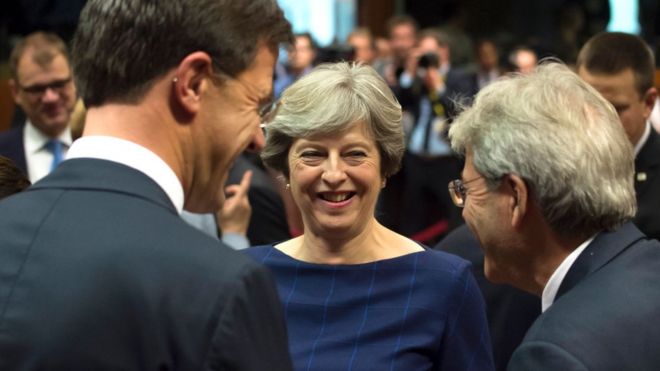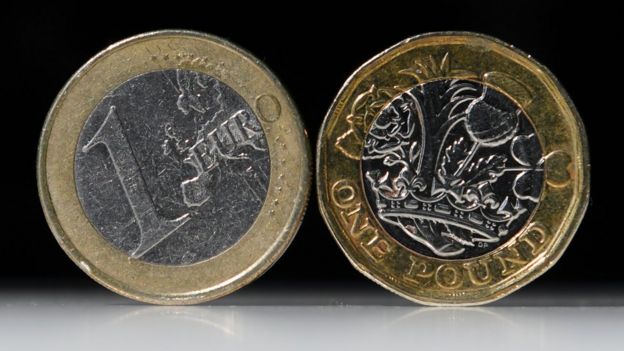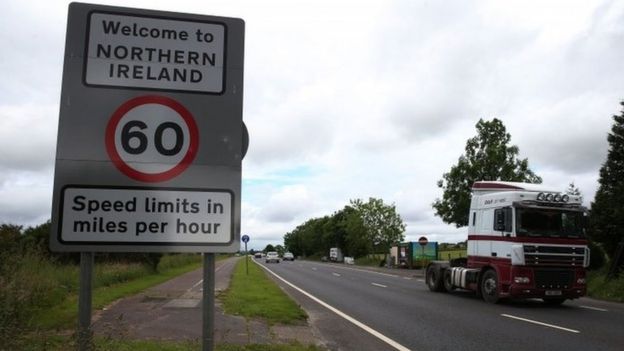 |
| EU leaders must decide whether "sufficient progress" has been made in the Brexit talks |
If, in the coming days, the EU does finally give the go-ahead for Brexit negotiations to move to talk of trade and transition - get ready for an anti-climax.
Rather than rolling full speed ahead as the UK would like, I've been told the EU will call for a period of reflection in January. Essentially for two reasons:
- So the 27 EU member states can agree their red lines and guidelines for phase two of Brexit talks.
- Because Brussels hopes the UK government will use "Brexit downtime" in January to agree a concrete position of what it wants from a future relationship with the EU
The EU insists it won't agree to a transition period without being clear what EU-UK relationship it will be transitioning to.
In Brexit good news this week, the pound climbed to its highest level in two months against the dollar, fuelled by optimism about a Brexit breakthrough.
The bad news: those on the inside, working furiously towards making the deal happen, have become less optimistic about moving to the next stage of Brexit talks any time soon.
All important now is whether EU leaders will decide that "sufficient progress" has been made on the three key divorce issues: the financial settlement, Ireland and citizens rights.
The pendulum could still swing either way and time is running out.
An EU-imposed deadline expires this Monday, by which time Brussels told the UK it had to take a leap forward on Ireland and the money issue (there is widespread acceptance of progress on citizens' rights) or forget broader Brexit talks for months.
 |
| The financial settlement has been a key obstacle in the way of expanding Brexit talks |
Theresa May travels to Brussels as the deadline runs out, rather like a grim-faced Cinderella determined to hold on to her carriage even on the stroke of midnight.
Going back to our cheery financial markets, they were reacting to news of progress on the financial settlement. That, for months, had been the main obstacle in the way of expanding Brexit talks.
And yes, now the purse strings seem to be loosening in Downing Street, diplomats in Brussels are suddenly smiling secretively, rather than pursing tight lips, when asked by journalists about the so-called Brexit bill.
But a deal hasn't yet been finalised and there's still plenty of room for those two steps back after the one step forward.
Amongst other things, Brussels angrily rejects the British insistence that money paid must be linked to a future trade deal with the EU.
The EU says the so-called Brexit bill pertains to the past - the UK honouring financial commitments made while an EU member. Nothing to do with the future, it claims.
There's little trust between the two sides at this point.
Even if the UK promises to pay up, Brussels frets it may later withdraw the offer if Brexit negotiations don't go Britain's way.
So we can mark the money issue as "Progress but..."
 |
| The Irish border is one of the most challenging Brexit divorce issues |
Now to Ireland.
The Irish border has, without doubt, suddenly overtaken finances as the most challenging Brexit divorce issue.
The complications were always there, of course: Downing Street wants a Brexit where the UK leaves the single market and European customs union, yet at the same time the prime minister says she's committed to avoiding the re-introduction of a hard border between Northern Ireland and the Irish Republic.
That feels very square peg, round hole when you think that Northern Ireland will be part of the post-Brexit UK that may or may not work out a trade deal with the EU, while the Republic of Ireland remains a member of the European Union.
Ireland became increasingly frustrated with the media/Brussels/London obsession with the Brexit bill. It was also outraged by the British assertion that the Ireland border conundrum could only be sorted in phase two of Brexit negotiations, outlining future EU-UK relations.
Irish diplomats told me in indignant tones that they felt the British government viewed the border problem in purely economic terms rather than fully appreciating the potentially explosive socio-political consequences a hard border would probably have.
British diplomats sounded equally indignant. They regard the Irish demand now, in December, for written commitments that there will be no regulatory divergence across the border as impossible.
They also bristle at any suggestion that the UK government might be cavalier about the future of the Good Friday agreement (signed in 1998, ending decades of conflict in Northern Ireland).
Relations between London and Dublin are tricky historically but had become warmer than they'd been in a long, long time. Before Brexit.
Now a deep frost lies between the two capitals.
It seems absurd now to think back to the immediate aftermath of the Brexit vote, when there was a suggestion Ireland might mediate informally between the UK and the EU. Its understanding and close relations with both sides was thought to run so deep.
Now Ireland has joined the ranks of other former close allies of the UK in EU circles, like Denmark and the Netherlands, that make it plain: they have become increasingly alienated from the UK during the Brexit process to date.
So, all things considered, will the EU give the green light this December to start Brexit talks on transition and on trade?
Both sides want to move on.
But I'd say what looked probable such a short time ago is still possible, but far from definite.
Source: BBCNews

No comments:
Post a Comment
Add a Comment...